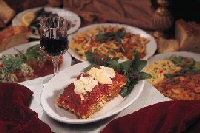

|
|
| Musical Musings: Miscellaneous |
|
|
The Recipe for SuccessJohn Bishop, in his column In the Wind from the March 2010 issue of The Diapason magazine, quotes Suzanne McAllister, director of music at Epiphany Episcopal Church in Winchester MA: Trapped on the paper, it is just a lot of lines and squiggles, circles and flags, black and white — an ancient language, undecipherable to the uninitiated. But to those who are "called" to it, music on the page is the door to a multi-colored, "sensational" world, both a challenge and a reward for heart, mind, and soul. It seems improbable that a few dozen pages of black and white "directions" could convey the recipe for an opera, or a symphony — and yet they do. But it is only the recipe. It takes a parish choir to pick up the pages, to apply much valuable time and energy, to learn the skills in order to share this amazing transformation with each other, with a church family, and in the praise of the Creator who has gifted us with the miracle that is music. This got me thinking. I've heard, and even repeated, often that what lines the shelves of our choir libraries, what fills the folders of our choristers, what sits on the racks of our pipe organs, is not the music. No .... the music is much more elusive. It's what blossomed in the mind of the composer and lived there in perfection. The music has to go through many, many obstacles before it becomes a reality:
Mr. Bishop continued in The Diapason:
I love to cook, as does Mr. Bishop. The parallels between cooking and making music are numeous and quite accurate. No one was ever moved by looking at a shelf full of music manuscripts, and no one ever swooned over a cookbook. The manuscript and recipe are only guides or maps of what the real music or the real dish is like. Just as the chef learns to chop ingredients correctly, to blend flavors with care, to taste – taste – taste; so, too, must the chorister learn to breathe properly, to pronounce words correctly and uniformly, to listen – listen – listen. When the dishes are all prepared well, at the proper time, and lovingly served, then a great dining experience unfolds. The senses are awakened and we taste the actual dream that floated in the mind of the recipe-creator. And, as I fimly believe about eating together, our souls are enriched by breaking bread with our family and friends. When the motet has been well rehearsed, when the time is right and the music takes its place in the liturgy, a great spiritual experience unfolds. Not only is the Maker praised by the text and the notes, but the singers are enriched by the glorious art of music-making and the listeners are edified by the composition's enactment. The senses are awakened and we hear the actual dream that floated in the mind of the composer. Isn't music ... and isn't cooking ... wonderful! |
 Ingredients in a recipe are the blueprint, the roadmap to be translated by the cook, through the utensils and heat sources, into the magic which is delicious food.
Notes on a score — those squiggles and symbols — are the recipe, the blueprint, the format to be translated by the musician, through the instrument, into the magic that is audible music.
The chef learns the basics, the techniques, the theories, and the chemistry.
Once he knows those basics and can reliably prepare and present traditional dishes, he's freer to experiment because he knows the rules.
The musician learns the techniques, the historical priorities, and the language of the art.
Once he can reliably prepare and present the great masterworks, he's more free to experiment, to innovate, and to challenge himself and his audience.
How's that for a lot of lines and squiggles?
Ingredients in a recipe are the blueprint, the roadmap to be translated by the cook, through the utensils and heat sources, into the magic which is delicious food.
Notes on a score — those squiggles and symbols — are the recipe, the blueprint, the format to be translated by the musician, through the instrument, into the magic that is audible music.
The chef learns the basics, the techniques, the theories, and the chemistry.
Once he knows those basics and can reliably prepare and present traditional dishes, he's freer to experiment because he knows the rules.
The musician learns the techniques, the historical priorities, and the language of the art.
Once he can reliably prepare and present the great masterworks, he's more free to experiment, to innovate, and to challenge himself and his audience.
How's that for a lot of lines and squiggles?